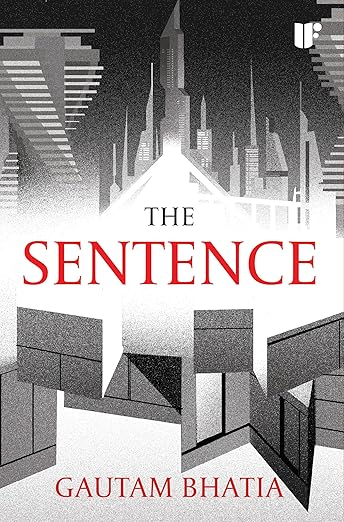Review: The Sentence by Gautam Bhatia
As of the end of last year, I have joined storied SFF magazine Locus as part of their stable of reviewers. It’s a slightly different experience than I’m used to—a print magazine, Locus has a longer lead time than most publications I’ve written for, and are more dedicated to running reviews in tandem with their subjects’ publication dates, which is not something I tend to care about. They also keep their reviews subscriber-only until a month after their print publication. Which means that I have now been waiting several months to share with everyone my thoughts on Gautam Bhatia’s third novel, The Sentence, in which the convolutions of a fantasy city’s politics play out in a high-stakes court case.
Bhatia is perhaps best known to fans of fantasy and science fiction as the hardworking editor in chief of Strange Horizons magazine, and as the author of two previous works of fiction, The Wall (2020) and The Horizon (2021). In addition to these pursuits, however, Bhatia is a lawyer and a scholar of the Indian constitution, and thus perhaps uniquely aware of how much of the infrastructure of our lives is written down in constitutions and law books and wrangled over in courtrooms. For all that the fantastical genres have spent a great deal of time, in recent years, exploring how societies order themselves (and how that order breaks down), very little attention has been paid to the role of law in the process. In his third novel, The Sentence, Bhatia seeks to address that gap in what feels like a first, a fantasy-world legal thriller.
As Nila wends her way through the surprisingly scant documentation and absolutely voluminous mythmaking around Jagat and the murder of the director, she encounters no shortage of John Grisham-esque flourishes – boardroom shenanigans, shady characters who deliver a crucial piece of evidence, the requisite car chase. The heart of the novel, however, is in debate, in the way that Nila’s explorations of her city’s history and present shed light on, and influence, her legal maneuvering.
Nila – and her trusty roommate and sidekick Maru – discuss both the facts of the case and the merits of their legal strategy. Should she try to impugn long-accepted testimony, or take a purely procedural approach? Should she, as an abolitionist group urges her to do, attack the validity of the sentence of cryogenic suspension itself? (The bitterness with which Nila dismisses the naivety of this suggestion – guaranteed, she says, to produce nothing but bad precedent – feels particularly lived-in.) Inevitably, these discussions end up hinging on the gap between law and ethics, on Peruma’s tangled history, and on realpolitik. When Nila’s superiors try to persuade her to drop the case, they remind her that Guardians rule by consent. A sufficiently provocative ruling, they warn, could bring the entire system down.
I mentioned The Sentence is my most anticipated books post last month, and as I note there, since the review was handed in there has been some progress in bringing this book—which is currently available for purchase only in India—to readers outside the subcontinent. Hopefully it won’t be long before the rest of you can discover this unique approach to both fantasy, and thinking about the role of law in society.

